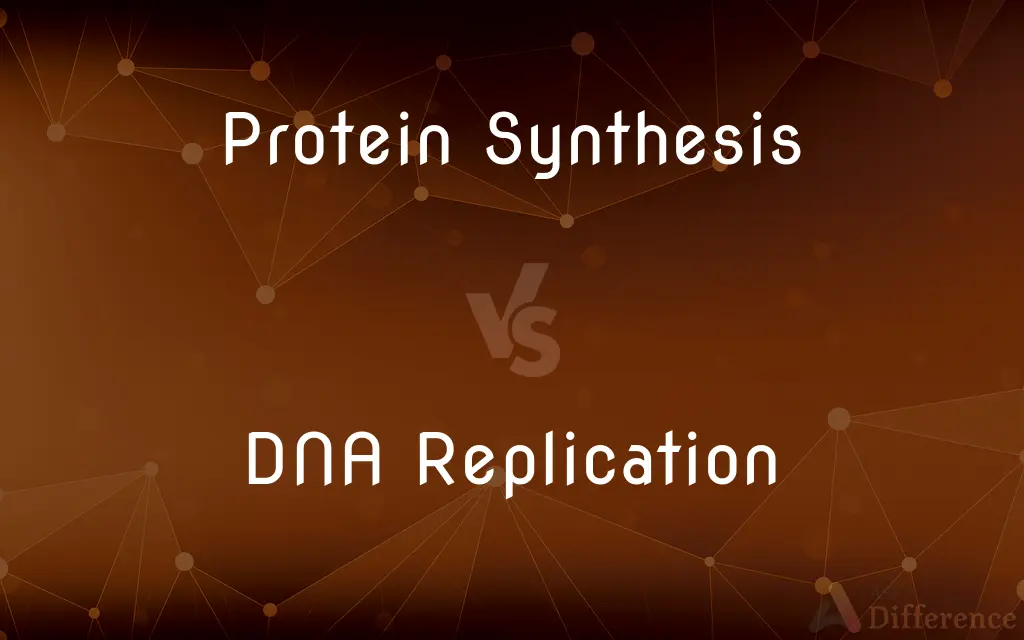Protein Synthesis vs. DNA Replication — What's the Difference?
Edited by Tayyaba Rehman — By Fiza Rafique — Published on December 9, 2023
Protein Synthesis translates genetic code into proteins; DNA Replication duplicates DNA for cell division.

Difference Between Protein Synthesis and DNA Replication
Table of Contents
ADVERTISEMENT
Key Differences
Protein Synthesis and DNA Replication are both vital processes in a cell, but they serve distinct purposes. Protein Synthesis is the cellular mechanism where the genetic code, stored in DNA, is used to produce proteins. These proteins, with their diverse range of functions, are essential for the survival and functioning of an organism. On the other hand, DNA Replication ensures that the DNA molecule is precisely duplicated so cells can divide and pass on the genetic information to the next generation.
Diving deeper, Protein Synthesis happens in two primary stages: transcription and translation. In transcription, the DNA's genetic code is copied into RNA, specifically messenger RNA (mRNA). Following this, during translation, ribosomes read the mRNA and facilitate the assembling of amino acids to form proteins. In contrast, DNA Replication occurs in the cell nucleus, where the entire DNA molecule is unzipped and copied to produce two identical daughter DNA molecules.
When it comes to the importance of these processes, Protein Synthesis and DNA Replication stand as cornerstones of life. Without Protein Synthesis, a cell cannot produce the necessary proteins for its functions, leading to malfunction or cell death. DNA Replication, if flawed, can lead to mutations that might have profound implications, from benign to harmful, for the organism.
At a molecular level, the enzymes and mechanisms involved in Protein Synthesis and DNA Replication differ significantly. Protein Synthesis utilizes ribosomes, transfer RNA (tRNA), and a host of other factors to ensure accurate protein formation. DNA Replication employs enzymes like DNA polymerase, helicase, and ligase to ensure accurate copying of the DNA strands.
Comparison Chart
Purpose
Translate genetic code into proteins
Duplicate DNA for cell division
ADVERTISEMENT
Location
Cytoplasm (translation), Nucleus (transcription)
Nucleus
Key Molecules Involved
MRNA, tRNA, ribosomes
DNA polymerase, helicase, ligase
Result
Proteins
Two identical DNA molecules
Implication of Errors
Faulty proteins leading to potential cellular dysfunction
Mutations that might be passed to next generation
Compare with Definitions
Protein Synthesis
The cellular process of building proteins.
Cells rely on Protein Synthesis to produce enzymes for metabolic reactions.
DNA Replication
Occurs in the cell nucleus.
Cells prepare for division by undergoing DNA Replication.
Protein Synthesis
Translates genetic information into amino acid chains.
Muscle growth is heavily influenced by Protein Synthesis rates.
DNA Replication
Utilizes enzymes like DNA polymerase.
During DNA Replication, any error can result in genetic disorders.
Protein Synthesis
Utilizes ribosomes for translation.
Without Protein Synthesis, cells couldn't respond to environmental changes.
DNA Replication
Ensures genetic continuity during cell division.
DNA Replication accuracy is crucial to prevent mutations in offspring.
Protein Synthesis
Essential for organism growth and repair.
After a workout, athletes focus on enhancing Protein Synthesis for muscle recovery.
DNA Replication
Produces two identical DNA molecules from one.
Cancer can be a result of errors made during DNA Replication.
Protein Synthesis
Comprises transcription and translation stages.
Protein Synthesis ensures the accurate conversion of DNA's code into functional molecules.
DNA Replication
The process of copying DNA.
Before a cell divides, DNA Replication ensures each new cell gets the full genetic code.
Common Curiosities
Which enzymes are crucial for DNA Replication?
DNA polymerase, helicase, and ligase are crucial for DNA Replication.
Are transcription and translation part of DNA Replication?
No, they are stages of Protein Synthesis.
Where does Protein Synthesis primarily occur?
Protein Synthesis primarily occurs in the cytoplasm (translation) and the nucleus (transcription).
What happens if DNA Replication goes wrong?
Errors in DNA Replication can lead to mutations affecting the organism.
What role do ribosomes play in Protein Synthesis?
Ribosomes facilitate translation, reading mRNA to assemble amino acids into proteins.
Does DNA Replication produce proteins?
No, DNA Replication duplicates DNA; Protein Synthesis produces proteins.
What's the main purpose of Protein Synthesis?
Protein Synthesis translates the genetic code into proteins essential for cellular functions.
What could result from errors in Protein Synthesis?
Errors in Protein Synthesis can produce faulty proteins leading to cellular dysfunction.
Is Protein Synthesis related to DNA?
Yes, Protein Synthesis uses the genetic code in DNA to produce proteins.
Why is DNA Replication important?
DNA Replication ensures accurate duplication of DNA for cell division.
How many DNA molecules result from DNA Replication?
DNA Replication produces two identical DNA molecules from one original.
Why is DNA Replication necessary before cell division?
DNA Replication ensures both new cells receive a full, accurate set of genetic information.
What's the relationship between mRNA and Protein Synthesis?
mRNA carries the genetic code from DNA to ribosomes, directing Protein Synthesis.
Which process ensures an organism's growth and repair?
Protein Synthesis is essential for organism growth and repair.
Can errors in DNA Replication lead to genetic disorders?
Yes, errors during DNA Replication can cause genetic disorders if passed to offspring.
Share Your Discovery

Previous Comparison
DHEA vs. DHA
Next Comparison
AWT vs. SwingAuthor Spotlight
Written by
Fiza RafiqueFiza Rafique is a skilled content writer at AskDifference.com, where she meticulously refines and enhances written pieces. Drawing from her vast editorial expertise, Fiza ensures clarity, accuracy, and precision in every article. Passionate about language, she continually seeks to elevate the quality of content for readers worldwide.
Edited by
Tayyaba RehmanTayyaba Rehman is a distinguished writer, currently serving as a primary contributor to askdifference.com. As a researcher in semantics and etymology, Tayyaba's passion for the complexity of languages and their distinctions has found a perfect home on the platform. Tayyaba delves into the intricacies of language, distinguishing between commonly confused words and phrases, thereby providing clarity for readers worldwide.













































